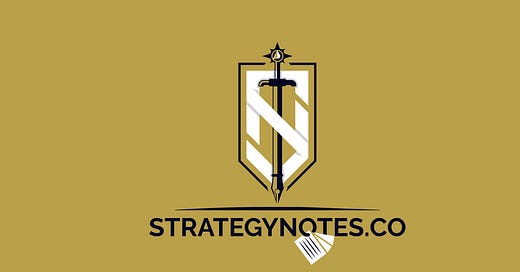What's the right scale of strategy for you?
The answer depends on who you are and what your goals are.
If you're an evironmentalist looking to save humanity's future on Earth, then it'll take decades and perhaps even centuries to change entire societies.
If you're in national security, then you're looking to provide security to a place and region, and your horizon is measured in about a decade (arguably, as far as production cycles of key technologies, or long-taking builds, like an aircraft).
If you're a tech company's leader, then you're looking at market competition several years out.
If you're a politician, then your yardstick is the field of potential competitors, which is about a year to a year-and-a-half out, in a given geographic boundary.
If you're a professional football coach, you're looking at 16- or 17-games in a league with 32 teams.
The horizon matters because your geography drives your strategy. With apologies to Sun Tzu, screw that "know yourself" stuff. That's just about impossible for most of us. Sometimes it’s better to settle for knowing where you are. Knowing your start point. Knowing your competitor's relative position.
And while we're at it, screw Steven Covey. His advice to "begin with the end in mind." Again, pretty hard to foresee what's to come, what the end might even look like. You can't allow your mind to go myopic-focus on the end. You still have to start. You still have to take the first step if you ever hope to take the last.
Knowing your start point does several things for you.
It's your first direction. You can't set a course if you don't have a known point. It's your Ground Zero, and we all need that starting block to push off from.
It also provides a confidence boost. It may not seem like a lot, it may not seem important, but getting that first step right builds morale. That's what retired Admiral Bill McRaven was talking about when he advised that people should make their beds first thing in the morning (in what's likely still the most-watched graduation spech of all time).
Perhaps most importantly, and maybe this goes without saying, but you can't finish unless you start. You'll never make it unless you get going. There's a ton of endeavors that get talked about and planned for and considered and analyzed and mulled over and thought-through and discussed and calculated and studied and weighed and measured and investiaged and examined. Forever.
But thought without action is lame. And so the first step, that first thoughtful step, is necessary to all achievement.
Your strategic scale conditions that first step. It’ll tell you what the gait should look like. If in decades, then plan accordingly. If game-by-game, week-by-week, plan accordingly.
But scale also provides a sense of pace. What the metabolism should be. Government organizations with longer time horizons should work and plan and invest to match their aims.
Worst of all is the strategist that confuses the scale. Planning in decades does little good if you get fired for a bad year. Anger at a bad day is ridiculous if your goal is generational and civilizational change.
Strategists, find your scale and fight accordingly.




